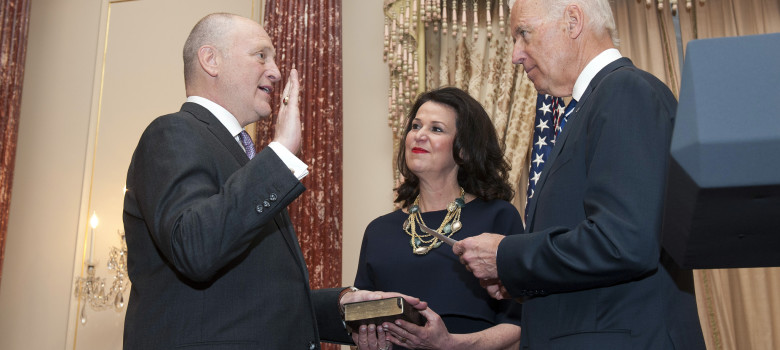Last year, the federal government trumpeted anti-counterfeiting legislation as a key priority. The bill raced through the legislative process in the winter and following some minor modifications after committee hearings, seemed set to pass through the House of Commons. Yet after committee approval, the bill suddenly stalled with little movement throughout the spring.
Why did a legislative priority with all-party approval seemingly grind to a halt?
My weekly technology law column (Toronto Star version, homepage version) suggests that the answer appears to stem from the appointment of Bruce Heyman as the new U.S. ambassador to Canada. During his appointment process, Heyman identified intellectual property issues as a top priority and as part of his first major speech as ambassador, singled out perceived shortcomings in the anti-counterfeiting bill.
Heyman’s primary concern relates to in-transit shipments, which involve goods that do not originate in Canada and are not destined to stay in Canada. The Canadian bill excludes in-transit shipments from the scope of new rules that grant customs agents unprecedented powers to seize suspect shipments without court oversight.
“We are pleased Canada has introduced legislation that will give its border officials the authority to seize pirated and counterfeit goods, but the United States is concerned because the bill does not apply to goods that are shipped through Canada, from a third country to the U.S.”
The Canadian position is based at least in part on serious concerns about misuse of in-transit seizures. For example, in November 2008, Dutch customs agents seized a shipment of AIDS/HIV medications at Schiphol Airport near Amsterdam. The Nigeria-destined medications originated in India, which produced a generic version of abacavir, an anti-retroviral drug. The global health group UNITAID had purchased the 49 kilograms of abacavir with the Clinton Foundation scheduled to assist in their distribution once they reached Africa.
The seizure in the Netherlands came at the request of GlaxoSmithKline, the pharmaceutical giant that claimed the Indian drug violated its patent rights and contained counterfeit materials. UNITAID maintained that the drugs were not counterfeit, but the seizure dragged on for months.
The Dutch seizure was not an isolated incident. During 2008 and 2009, Doctors Without Borders found at least 19 shipments of generic medicines from India to other countries were impounded while in transit in Europe. Several years later, the Court of the European Justice ruled against in-transit seizures, concluding that there was no infringement in the EU.
While Dutch seizures of Africa-bound pharmaceutical drugs have little connection to Canada, the experience with in-transit seizures of generic pharmaceutical drugs provides an important cautionary tale of why countries are right to resist targeting shipments that do not originate domestically and are destined for a different country. Indeed, many groups maintain that the seizure of generic pharmaceuticals in transit would pose a threat to international trade, development and public welfare.
Despite the delay, there is little doubt that the anti-counterfeiting bill will ultimately become law. In fact, with some of the bill’s provisions included in the Canada – Europe trade agreement, there may soon be a treaty requirement to address border measures.
With the fall parliamentary session set to start in a few weeks, the emerging question is whether the government will continue to resist foreign lobbying to distort the balance in the bill, by maintaining both the in-transit shipment exclusion and a personal traveler exception, whose removal could lead to increased border searches of physical luggage and electronic devices. If amendments are made late in the legislative process, it may well be a case of caving yet again to unwarranted U.S. pressure on intellectual property laws.








Why would anyone in their right mind cave to an ex Goldman Saches shill? He should be in prison, not the U.S. ambassador to Canada….
What has this world become…
Pingback: Why U.S. Pressure Is Behind the Stalled Canadian Anti-Counterfeiting Bill » infojustice
What Spike said. Another example of the US Government being completely owned by big business.
Goldman Sachs is the correct spelling if anybody wants to google it
My every week technology law line (Toronto Celebrity edition, home-page version) indicates that the response seems to control from the consultation of Bruce Heyman as the new U.S. ambassador to North america. During his consultation process, Heyman recognized ip problems as a top concern and as part of his first significant conversation as ambassador, designated recognized disadvantages in the anti-counterfeiting invoice. https://www.youtube.com/watch?v=qg8dAbx28pE
I’m here because I just watched Elizabeth May’s speech in Parliament today.
https://www.youtube.com/watch?v=pPsJSPFREq8&feature=youtu.be
Thanks for filling in some of the details for me.
Pingback: The Price of Admission to the TPP Talks Revealed: U.S. Demanded Canada Pass Anti-Counterfeiting Legislation - Michael Geist